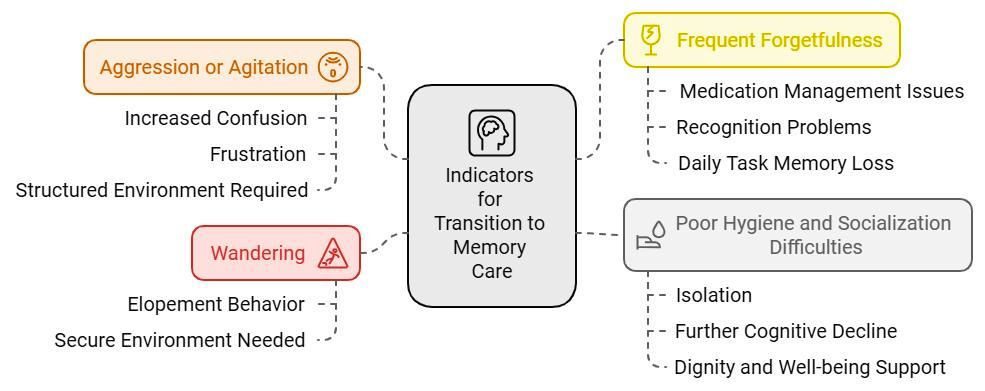


Growing older can be tough, and sometimes it means learning how to transition from assisted living to memory care. It is a big decision that can feel overwhelming.
But you don’t have to do it alone. We’re here to explain the process in a way that makes it easier and less stressful for you and your loved one.

Assisted living supports everyday tasks such as bathing, meal preparation, and medication management. On the other hand, memory care facilities are specially designed for individuals with memory impairments such as Alzheimer’s or dementia.
These facilities offer 24-hour supervised care, structured activities, and specialized support to promote mental engagement and slow the progression of memory diseases.
Wandering – Seniors may exhibit elopement behaviors, indicating a need for a more secure environment.
Aggression or Agitation – Behavioral changes can signal a decline in cognitive health.
Frequent Forgetfulness – Increased memory loss can affect daily functioning and safety.
Poor Hygiene and Socialization Difficulties – These issues often arise as dementia progresses, necessitating specialized care.

Start the conversation about transition early. It’s crucial to involve the individual in the process, if possible, and discuss their fears and expectations.
The medical team will provide a comprehensive assessment to guide the transition. They can recommend the right time and the best facilities based on the individual’s needs.
Select a facility that aligns with your loved one’s needs and preferences. Visit different facilities, observe their programs, and ask about their approach to memory care.

Once the decision is made, communicate it to your loved one in a pleasant and supportive manner. Explain why the transition is necessary and how it will benefit them.
Plan the move in detail to minimize stress. Organize their belongings and decide what will go with them. A familiar environment can be comforting and can ease the transition.
Transitions are emotionally challenging. Support your loved one by acknowledging their feelings and being patient with their responses.

Staff at the facility play a critical role in helping new residents settle down. They can make your loved one feel welcome and help them adjust to the new environment.
Even after moving in, it’s essential to keep family and friends involved. Regular visits can help the individual feel loved and connected.

Keeping regular contact helps your loved one feel less isolated. You can share meals, participate in activities, or spend time together.
Monitor your loved one’s progress closely. Any changes in behavior or health should be addressed promptly.
Transitioning from assisted living to memory care is a significant step. It requires careful planning, open communication, and continuous support.
However, the right approach can be a positive change for your loved one’s overall well-being and quality of life.